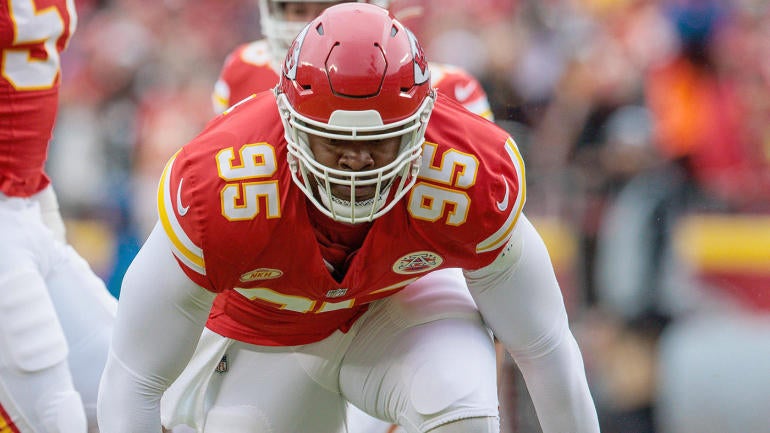
The franchise designation has evolved into a powerful management tool that restricts a team's best free agent in a given year from entering the open market regardless of whether he is a true marquee player. It wasn't meant to work this way. The franchise tag was originally intended to be a precursor for the indispensable signing long-term contracts.
Most players aren't happy when given a franchise tag. The designation can hinder the ability to gain long-term security because players must incur the risk of serious injury and poor performance again after already playing out their contracts when an agreement on a long-term deal can't be reached. In these cases, the franchise tag is essentially a high salaried one-year "prove it" deal.
The franchise tag has been used 24 times over the last three years (2021-2023). Less than half of the time (11 of 24 or 45.83%) during this time frame was a long-term deal signed while under the designation.
A look at how franchise tags work is below. The projected 2024 franchise numbers and an examination of the best candidates to receive the designations next year follows.
Franchise tag logistics
NFL teams can retain the rights to one of its impending free agents in 2024 with the use of a non-exclusive or exclusive franchise tag during a 15-day period from Feb. 20 to March 5.
How franchise tenders are calculated is misunderstood. Prior to the 2011 NFL collective bargaining agreement, non-exclusive franchise tags had been an average of the five-largest salaries in the prior year at a player's position or 120% of the prior year's salary of the player, whichever was greater. For franchise tag purposes, salary means a player's salary cap number, excluding workout bonuses and most other performance bonuses.
The 120% and five-largest salaries provisions have remained intact, but the formula component is now calculated over a five-year period that's tied to a percentage of the overall salary cap. More specifically, the number for each position is derived by taking the sum of the non-exclusive franchise tags as determined by the original methodology for the previous five seasons and dividing by the sum of the actual NFL salary cap amount for the previous five seasons. The resulting percentage, which is known as the cap percentage average in the CBA, is then multiplied by the actual salary cap for the upcoming league year.
This non-exclusive tag allows a player to negotiate with other NFL teams, but if he signs an offer sheet with another club, his team has five days to match the offer. If the offer is not matched, his team will receive two first-round picks as compensation from the signing team.
Under the exclusive franchise tag, a player will receive a one-year offer from his team that is the greater of the average of the top-five salaries at his position once the restricted free-agent signing period of the current league year has ended (April 19 for 2024) or 120% of his prior year's salary. The non-exclusive number is initially used as placeholder and adjusted upwards if the exclusive calculation dictates once restricted free agency ends. A player cannot negotiate with other teams with the exclusive franchise tag.
The transition tag has been used with a lot less frequency than the franchise tag. It is based on the average of the top 10 salaries at a player's position using the same methodology as non-exclusive franchise tag calculations. The 120% provision also applies. Teams have the same right of first refusal as with franchise tags, but do not receive any draft choice compensation for declining to match an offer sheet.
2024 tag projections
The chart below contains an early look at the 2024 franchise tags. I keep track of the salary data necessary to do the calculations under the franchise and transition tag formulas. I recently confirmed with my NFL sources the 2023 data entering the formula.
There was a report recently that the 2024 salary cap could exceed $240 million. The amount of $242.5 million is being used for the 2024 salary cap. It's essentially the same as the 7.97% increase in the salary cap to the current $224.8 million figure. The franchise tags are preliminary because the numbers can't be finalized until the 2024 salary cap is set, which is typically in late February or early March.
| 2024 | 2024 Cap | |||
|---|---|---|---|---|
Position | Projected Tag | % Average | 2023 Tag | % Change |
Cornerback | $18,802,000 | 7.753% | $18,140,000 | 3.65% |
Defensive End | $20,247,000 | 8.35% | $19,727,000 | 2.64% |
Defensive Tackle | $20,986,000 | 8.654% | $18,937,000 | 10.82% |
Linebacker | $22,794,000 | 9.40% | $20,926,000 | 8.93% |
Offensive Line | $19,925,000 | 8.217% | $18,244,000 | 9.21% |
Punter/Kicker | $5,682,000 | 2.343% | $5,393,000 | 5.36% |
Quarterback | $36,367,000 | 15.00% | $32,416,000 | 12.19% |
Running Back | $11,348,000 | 4.68% | $10,091,000 | 12.46% |
Safety | $16,258,000 | 6.704% | $14,460,000 | 12.4% |
Tight End | $12,051,000 | 4.97% | $11,345,000 | 6.22% |
Wide Receiver | $20,714,000 | 8.542% | $19,743,000 | 4.92% |
Note: Projections assume 2024 salary cap is $242.5 million | ||||
Top 2024 candidates
The Vikings are precluded from designating quarterback Kirk Cousins and edge rusher Danielle Hunter, who has a career-high 15.5 sacks this season, as a franchise or transition player. Their respective contracts void on the last day of the 2023 league year (March 13), which is after the designation window has closed.
A franchise tag will be too cost prohibitive for the Buccaneers with wide receiver Mike Evans because of the 120% of prior year's salary provisions. Evans' tag number will be $28,438,200.
The Chiefs and Jones weren't in the same ballpark on a long-term deal although both sides felt he should be the NFL's second-highest paid interior defensive lineman. Jones was reportedly seeking $30 million per year to put him in the same vicinity as Aaron Donald, who signed a three-year, $95 million contract averaging $31,666,667 per year with the Rams in 2022. The Chiefs were more comfortable with paying Jones slightly more than Quinnen Williams, who is second in the interior defensive lineman salary hierarchy, received from the Jets in July. Williams signed a four-year, $96 million deal averaging $24 million per year.
Jones reiterated his goal of spending his entire career with the Chiefs after ending his 51-day holdout without a long-term contract before preparations for Kansas City's second regular-season game began. Instead, modifications were made to Jones' remaining 2023 contract year. $5.5 million of performance bonuses were added to his deal.
Jones' franchise tag projects to $32,169,912 because the 120% of prior year's salary provisions. This would easily be the largest franchise tag for a non-quarterback in league history. Placing a franchise tag on Jones with the intention of trading him isn't out of the question. Jones' trade value should be more than the 2025 compensatory pick, which would be at the end of the third round at best, the Chiefs would get for him leaving in free agency.
The Panthers didn't reportedly turn down two first-round picks and a second-round pick from the Rams for Burns during the middle of 2022 season to let him walk out the door when his rookie contract expires. Trade inquiries were also rebuffed at this year's late October trade deadline.
Getting a long-term deal done with Burns has been a difficult proposition. Burns was going to have a hard time reconciling the rejected trade value with offers in the same range as the $23.5 million per year Maxx Crosby received in 2022 from the Raiders on a four-year contract extension. The five-year $170 million extension averaging $34 million per year Nick Bosa received from the 49ers right before the regular season started only complicated matters. Burns surely took note of the 21.4% gap between Bosa and the four-year, $112.011 million extension averaging $28,002,750 per year T.J. Watt received from the Steelers as the start of the 2021 regular season was approaching to reset the edge rusher market.
Higgins won't have third straight 1,000 receiving-yard season because of a hamstring injury that cost him three games in November. Offers the Bengals made to extend Higgins' contract before the season were considered as "low." Higgins wasn't interested in continuing to negotiate once the season started. He is the No. 2 receiving option in Cincinnati behind Ja'Marr Chase, but a No. 1 wide receiver on some other teams. Higgins will be in high demand should he hit the open market in March.
Allen has been forced to play under a $10.892 million fifth-year option this season because the Jaguars didn't make an effort to extend his contract. He has responded with a career-high 13.5 sacks, which is tied for fifth in the NFL. Allen's salary floor should be the four-year, $98 million extension averaging $24 million per year Montez Sweat signed with the Bears in November.
Wilkins is playing on a $10.753 million fifth-year option after negotiations with the Dolphins couldn't produce a new deal. Three of Wilkins' fellow 2019 first-round pick interior defensive linemen -- Dexter Lawrence (Giants), Jeffery Simmons (Titans) and Quinnen Williams (Jets) -- signed four-year extensions between $22.5 million and $24 million per year. Wilkins surely feels his market is well defined. Wilkins is holding up his end of the bargain with a career-high eight sacks this season.
A good case can be made for Winfield being the NFL's best safety along with Jessie Bates III, who signed a four-year, $64.02 million contract with the Falcons as a free agent in March to become the NFL's fourth-highest paid safety at $16.005 million per year. Winfield has done a little bit of everything statistically this season. He has three interceptions, five forced fumbles, four fumble recoveries and leads NFL safeties with five sacks.
This year has been a rollercoaster for Johnson from a business standpoint. The two sides weren't on the same page with a contract extension when Johnson's camp was granted permission to shop him to other teams shortly before the trade deadline. The Bears were reportedly looking for a late first-round pick or early second-round pick in a trade. Johnson has recently expressed a desire to remain in Chicago.
Football business hasn't affected Johnson on the field. In addition to having a career-high four interceptions, opposing quarterbacks are only completing 45.2% of passes (24 of 53 attempts) when targeting him. The Bears quickly getting a deal done with Montez Sweat shortly after acquiring him at the trade deadline opens up the franchise tag for Johnson.
Madubuike has been the NFL's most consistent pass-rushing interior defensive lineman this season. He tied an NFL record with at least a half-sack in 11 straight games during a Week 15 contest against the Jaguars. Madubuike leads all interior defensive linemen with 12 sacks. He would be justified in looking to top the $24 million per year Quinnen Williams got from the Jets in July.
Pittman recently called failing to reach a contract extension before the season a blessing in disguise. He is having a career year with 99 receptions, 1,062 receiving yards and four touchdown catches in 14 games. The Colts really can't afford to let their best receiving threat get away with 2023 fourth overall pick Anthony Richardson, who suffered a season-ending shoulder injury in Week 5, as the quarterback of the future.
Conventional wisdom suggested that the Commanders were going to be facing a franchise-tag decision between defensive ends Montez Sweat and Chase Young. That was before Sweat and Young were dealt to the Bears and 49ers respectively at the trade deadline. Their departures have put the franchise tag in play for Curl, who has been mainstay on the defense since his rookie year.




































